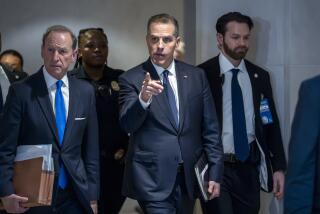U.S. Dismisses Iraqi Overture to Congress
- Share via
UNITED NATIONS — Iraq on Monday made its second offer in less than a week regarding inspections of its weapons systems, invitations under wary consideration by the United Nations but dismissed immediately by the White House as a stalling tactic.
As Washington debated whether Iraq’s suspected development of biological, chemical and nuclear weapons warrants military strikes, an Iraqi parliamentarian invited members of Congress to bring experts of their choice to search alleged weapons sites.
The White House rejected the offer with hardly a comment, and Defense Secretary Donald H. Rumsfeld scorned the idea of a handful of Congress members scouring Iraq for hidden mobile and underground weapons caches.
“They’d have to be there for the next 50 years trying to find something,” he told reporters. “It’s a joke.”
But U.N. Secretary-General Kofi Annan said Monday that despite initial doubts, he would not reject Iraqi overtures just yet.
Last Thursday, Iraqi Foreign Minister Naji Sabri invited the United Nations’ chief weapons inspector, Hans Blix, for discussions in Baghdad to review the outcome of previous disarmament talks.
Annan rebuffed the offer Friday, concerned that Iraq was trying to undo earlier agreements on U.N. inspections. The Security Council has mandated that weapons inspectors must be allowed to make an unfettered and comprehensive assessment in Iraq before formal talks can resume. U.N. inspectors have not monitored Iraq’s weapons development since they left the country before a U.S.-led bombing campaign in December 1998, and they have not been allowed to return.
But after a private lunch with the Security Council on Monday, Annan said that if Iraq would allow U.N. weapons inspectors back into the country per Security Council guidelines, he would consider allowing Blix to visit.
“We would want to discuss with them the return of the inspectors,” Annan said. “If Iraq is open to that idea, there are practical means to send the inspectors back.”
Annan has held three rounds of talks with Iraqi officials this year on the possible return of weapons inspectors and the lifting of sanctions imposed after Iraq invaded Kuwait in 1990. At the last meeting, in Vienna a month ago, Annan refused to set a date for another encounter because he felt that Iraq was drawing out negotiations as a stalling tactic.
U.N. officials said privately that they are concerned that Iraq is trying to further divide the Security Council and put old issues back on the table.
On Monday, though, Annan said the Iraqi overture was worth a closer--but brief--examination.
“Whether this is a real break and a real change in attitude is something that we will have to test,” he said. He replied to Iraq formally Monday evening and told reporters that he hoped for a quick response.
“I don’t think we should drag it out,” he said.
Of the Security Council’s five veto-wielding members, Russia is the strongest supporter of Iraq’s proposal of last week, welcoming it as an “important step toward resolving the crisis through political and diplomatic means.” France and China cautiously welcomed it, but Britain and the U.S. clearly opposed new talks on Iraq’s terms.
The U.S. ambassador to the United Nations, John D. Negroponte, said Washington was “deeply skeptical” of Iraq’s invitation and viewed it as an attempt to rewrite the rules of U.N. inspections.
More to Read
Sign up for Essential California
The most important California stories and recommendations in your inbox every morning.
You may occasionally receive promotional content from the Los Angeles Times.










